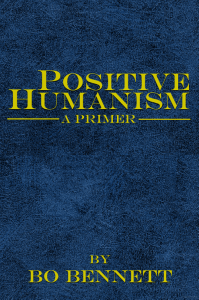The Science of Positive Humanism: An Interview with Author Bo Bennett

A successful entrepreneur and published author, Bo Bennett is currently the producer and host of The Humanist Hour, the official broadcast of the American Humanist Association, where he can be heard weekly discussing a variety of humanistic issues, mostly related to science, psychology, philosophy, and critical thinking.
In his latest book, Positive Humanism: A Primer, Bennett makes a case for the application of science-based humanistic philosophies that establish and promote the positive effects of embracing a secular worldview.
“I realized that much of the animosity and mistrust towards nonbelievers resulted from a lack of understanding—partly due to the nonbeliever’s inability to articulate his or her position on issues such as morality,” said Bennett. “I realized that promoting the benefits of a secular worldview rather than criticizing religious ones would be a far more effective way to let the religious community know that we non-believers are good, trustworthy, moral people who also experience awe, wonder, and joy.”
TheHumanist.com interviewed Bennett on his new book and why positive humanism is important for a nonbeliever’s well-being.

Bo Bennett
TheHumanist.com: Why is the positive focus your book provides especially needed today?
Bo Bennett: According to a 2014 Pew global attitudes survey, 53% of Americans assert that it is necessary to believe in God to be moral—a number far greater than we see with other developed countries. Many reasons have been proposed for these findings, one of which is that this attitude linking belief in God with morality is a reaction to assertive and sometimes aggressive “new atheist” movement, which has been credited for the decrease in religiosity and the increased acceptance of secularity in this country. From these data and data from similar studies, we can conclude that the religious tend to have a very myopic view of secularity, one that is primarily formed by the Dawkins-esque style atheism, since this form of secularism has a much greater shock-value than other much more common forms of secularity. While positive humanism cannot compete in shock value, it can be very effective in changing attitudes through personal interaction by reflecting one’s humanist values through their actions and behaviors. Research continually confirms the idea that negative stereotypes are best mitigated by interaction between the group that holds the prejudices and the stereotyped group. However, there is a big assumption that is rarely mentioned: the stereotyped group must not act in a way that confirms the stereotyped behavior. As the United States becomes more secular we must “lead by example” and show America that our humanistic values lead to admirable behaviors, dismantling these negative and offensive stereotypes.
TheHumanist.com: You talk about well-being versus gratification. What’s the difference?
Bennett: Gratification is a short-term psychological state most often used when a want or desire is fulfilled. For example, one would experience gratification if they bought a new pair of shoes they wanted, but this gratification would soon be overshadowed by other wants and desires. Well-being is a term used to describe one’s psychological state that is less volatile than gratification, and a state that incorporates the totality of human experiences. For example, relationships, meaning in life, and one’s level of achievement all contribute to one’s well-being. Even with daily fluctuations in how one may feel, well-being remains fairly consistent barring any major life changes.
TheHumanist.com: What are some practical ways in which you can cultivate better well-being in relationships and life?
Bennett: In the book, I write about well-being theory in the area of positive psychology, the idea in which well-being can be reduced to five key domains or dimensions: positive emotion, engagement, relationships, meaning/purpose, and achievement (PERMA). Understanding these domains can help people avoid chasing things in life that they only think will bring them greater well-being and focus on pursuing that which will enhance one or more of these domains. To put in other terms, this can help people make better decisions that will lead to a greater sense of well-being. Many people focus on just the positive emotion domain thinking that is where happiness can be found, yet many of the actions and behaviors that bring us positive emotion have a greater negative effect on one or more of the other four domains. Conversely, many of the things we do in life that we would not generally consider “fun” such as comforting friends in times of sorrow, working tirelessly for a cause even if the chance of success is slim, or struggling to master a new skill, can do much more for our sense of well-being than any form of positive emotion alone ever can.
TheHumanist.com: Why is positive humanism a more direct path to better living than religion?
Bennett: Aristotle wrote extensively on the idea of Eudaimonia, which translated to today’s terminology is human flourishing. Aristotle understood that the things we want are only means to an end—the end being human flourishing. Much more recently, Martin P. Seligman, the “Godfather” of positive psychology, devised well-being theory (PERMA). Very often we seek things that we think can bring us increased well-being, but we are often wrong. Or in the case of religion, attainment of well-being comes with quite a bit of unnecessary baggage (i.e., supernatural beliefs, magical thinking, the adoption of destructive ideas proposed by primitive cultures). Religion is linked to increased well-being; there is no denying that. But a closer look at the research shows that religion means greater church attendance, which means more socialization, which means greater relationships, which leads to greater well-being. By understanding these factors of well-being, one can choose activities that contribute to well-being directly, or at least realize that there are other paths to well-being that don’t have the same baggage.
TheHumanist.com: Should we act as if free will exists, whether or not we know for sure if it does?
Bennett: The issue of free will presents a dilemma for the humanist. On the one hand, if we accept the idea of free will we must appeal to some magical or unprovable force that allows our choices to be uncaused, or redefine free will in such a way that it avoids the real issue and confuses people into submission. On the other hand, if we deny free will, we enter a slippery slope that excuses people from their actions and responsibilities, and allows people to not just play the victim card, but abuse it. My view of free will is based on our current scientific understanding of human behavior, specifically influence and achievement—one that does not attempt to answer the metaphysical question of free will, but offers a humanistic solution that will lead to increased personal and societal well-being. In short, we know that our thoughts, behaviors, and actions are at least greatly influenced by our genetics and environment. We also know that belief is a significant factor in achievement as well as with subjective experience of the world (e.g., think the placebo effect). Believing is part of the causal chain of events, therefore, believing we can achieve increases the odds that we will. In contrast, believing that we are powerless to change something greatly decreases the odds that we can change that thing. We don’t need to pretend that free will exists; we just need to accept the science behind belief and take a functionalist approach to free will if we want to achieve more in life.
TheHumanist.com: What are your personal feelings about the negativity that sometimes reveals itself in some online atheist forums? How can your book on positive humanism help?
Bennett: I spent three years contributing daily to the negativity on one of these forums. When I started exploring religion, I created the site debategod.org and added a debate forum where theists and atheists can debate any issue related to gods, religion, and faith. My debate style was quite moderate compared to most, but trying to remain positive in a religious debate is like trying to remain on a diet at the Cheesecake Factory. It is not the negativity itself that is a problem; many forms of what might be considered negativity are very effective in persuasion and social justice. The problem is that the negativity often leads to unkind, spiteful, cruel, contemptible, and obnoxious behavior that reflects poorly on the debater’s philosophy. This kind of behavior is not only demonstrably ineffective in persuasion but provides justification for the many negative stereotypes atheists have to endure. While my book does not talk about how to effectively engage Christians in debate while remaining respectful and kind (future book, perhaps), it may inspire readers to think twice about how they are representing not just themselves, but the secular community as a whole.
